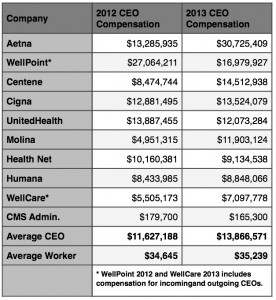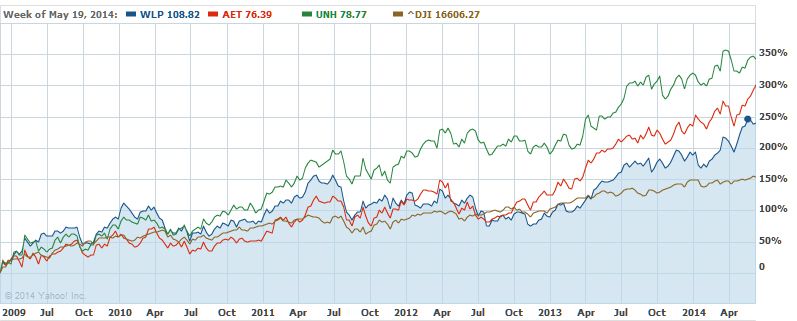General Discussion
Related: Editorials & Other Articles, Issue Forums, Alliance Forums, Region ForumsWhy Improving Access to Health Care Does Not Save Money
http://www.nytimes.com/2014/07/15/upshot/why-improving-access-to-health-care-does-not-save-money.htmlYou can make the health care system achieve better outcomes. But that will usually cost more or require some change in access. You can make it cheaper, but access or quality may take a hit. And you can expand access, but that will increase cost or result in some change in quality.
More people being able to get care was the point of the A.C.A. It’s possible that overall health care spending may remain flat or even decrease because of other changes to the health care system, or economic factors outside the system entirely. But with respect to emergency care, prevention and procedures, we should expect that increasing access will lead to more spending, not less.
It’s understandable that supporters of the law want it to increase access, increase quality and decrease spending all at the same time, but that’s very unlikely. Trade-offs occur; we need to be honest, and prepared, for what’s likely to happen.
Reader Comments:
Don McCanne
San Juan Capistrano, CA
The supposedly inevitable trade-offs between access, quality and cost ignore one important intervention regarding cost. The health care financing system in the United States is unique in its profound, costly administrative waste due to the highly inefficient, fragmented financing through a multitude private insurers and public programs (and no programs at all for the uninsured).
Merely changing to a universal single payer program or a national health service model dramatically reduces costs without having a negative impact on access and quality. The future trajectory of cost increases would be shifted downward - achieving that elusive bending of the cost curve. That is one way other nations provide truly universal health care at a per capita cost averaging only half of that of the United States.
In fact, the monopsonistic purchasing of a public program can actually improve quality by obtaining greater value in health care purchasing.
Some of the savings that would accrue by changing to a universal program such as an improved Medicare for all would be redirected to much needed improvements in access.
The important bottom line is that we really can achieve improved access, improved quality, and lower costs by structural reform of our highly dysfunctional financing system - a system that was only expanded by the Affordable Care Act.
Darlene
Albuquerque, NM
This author makes a compelling case that the ACA will not decrease costs because there are trade-offs among access, quality and cost. What he ignores is that we also have another system, Medicare, operating simultaneously, that provides good access and quality and manages to limit cost with little trade-off. In addition, it serves the population that consumes the greatest share of health care. You, good reader, know the difference. This article shows, once more, why we need a single payer system for all.
xchrom
(108,903 posts)GeorgeGist
(25,570 posts)will go a long way to removing the parasites from the 'system'.
bluesbassman
(20,375 posts)The crime in all of this is the outrageous amounts of profit the insurers are reaping, and as is far too common in our economy, the majority of those profits flow up.

Chief executive officers at Fortune 500 health insurance companies, who have opposed new regulations under the Affordable Care Act, emerged this month as one of the ACA’s greatest beneficiaries. Recently filed financial reports show that average compensation for these top nine health insurance CEOs rose by more than 19 percent in 2013, while several of the nation’s largest insurers more than doubled CEO pay.
Health Insurance CEO PayThe biggest winner was Aetna CEO Mark Bertolini, who received a staggering $30.7 million compensation package in 2013. This marks the largest payout to any health insurance executive since passage of the ACA and exceeded the compensation of the next two highest paid health insurer CEOs combined. The Bertolini pay package, which included a large “special one-time performance-based retention award,” represented a 131 percent increase over his $13.3 million compensation in 2012.
~snip~
“Families and patients are being asked to tighten their belts in the face of rising healthcare costs, while our premiums are being used to subsidize even more astronomical compensation for the already wealthy,” said Benjamin Day, Director of Organizing at Healthcare-NOW!, a nonprofit group that advocates for a single-payer system, sometimes called “an improved Medicare for all.”
“In contrast, the top administrator of Medicare – our public, universal health plan for all seniors, which is more efficient, provides better financial protection, and receives higher marks from patients than private health insurers – is paid less than $200,000 per year. The culture of excess at these for-profit corporations is incompatible with the goals of an efficient, ethical health care system, where every dollar diverted from patient care represents a loss of access for real families.”
http://www.healthcare-now.org/health-insurance-ceo-pay-skyrockets-in-2013
progressoid
(52,806 posts)
1StrongBlackMan
(31,849 posts)revenue, share price, or what? (The base-line is the DOW)
The latest research I can find (2013) suggests your information is not only wrong; but, wildly so.
By contrast, in the 18-month period before health care was passed, profit margins at these five insurers averaged just 6.88 percent.
http://www.huffingtonpost.com/2012/01/06/insurer-profits-health-care-reform_n_1190344.html
Source document: http://www.bloomberg.com/news/2012-01-05/health-insurer-profit-rises-as-obama-s-health-law-supplies-revenue-boost.html
progressoid
(52,806 posts)Even the headlines say so:
Insurer Profits Are Up In The Wake Of Health Care Law They Opposed
Insurers Profit From Health Law They Fought Against
1StrongBlackMan
(31,849 posts)progressoid
(52,806 posts)while the rich get richer, that represents tons of our money.
Gee, let's all cheer for corporate profits and the spreading income gap!
1StrongBlackMan
(31,849 posts)Never-mind that your post does not represent what you claim (100+% increases), the industry profits increased 2% over the 18 month before the ACA ... "So, I'm Right!"
Mind you, I oppose any for-profit healthcare financing scheme; but facts are facts.
progressoid
(52,806 posts)That's just a graph of the increase in stock of health insurance companies compared to the Dow. It's a booming market and the ubber wealthy are again cashing in.
1StrongBlackMan
(31,849 posts)BrotherIvan
(9,126 posts)And the fact that the US pays more for prescription drugs than other countries that negotiate costs. They deserve massive profits too!
ellennelle
(614 posts)to the point of the author's misleading perspective, s/he overlooks perhaps the two most important attacks on cost embedded in the ACA program.
first, the piece that took effect about a year ago requires 80% of all premium income to insurance companies to be devoted to patient care. remember? folks were getting checks back from their carriers for this reason? that makes a huge cut in all the profiteering being done at the expense of citizens' illness, with all those bloated CEO 7 and 8 figure salaries (BC/BS CEO's nationwide were pulling in an average of $10 mill, if i'm not mistaken).
second, with a reduction in uninsured, there is far less demand placed on ERs, as folks see their doctors before problems become urgent and immediate. this is also huge. what we have to back that up is at least the complete demise of those traveling free clinics, particularly in the south. remember when the one is i think it was AR folded up? like, wasn't it only 3 months after ACA went into effect? i know that this does not affect overall medical cost reduction, but that datum alone shows just how many folks were ending up at the ER end of the spectrum, and who now are not so dependent on free or ER care. oh yeah; except in those mean and miserly states where the exchanges and medicaid were rejected. sigh.
i don't have numbers on the difference just these two factors make, but i cannot imagine they are trivial. and their offset sure as hell would not be overridden by access and quality improvements. in fact, these two points alone themselves are quality and access improvements!
so, :-P to the hapless writer of that piece i will not even bother to visit the nytimes to read it.
carry on, folks.
X_Digger
(18,585 posts)eridani
(51,907 posts)http://www.nytimes.com/2008/02/05/health/05iht-obese.1.9748884.html?_r=1
Smokers and the obese cheaper to care for, study shows
LONDON — Preventing obesity and smoking can save lives, but it does not save money, according to a new report.
It costs more to care for healthy people who live years longer, according to a Dutch study that counters the common perception that preventing obesity would save governments millions of dollars.
"It was a small surprise," said Pieter van Baal, an economist at the National Institute for Public Health and the Environment in the Netherlands, who led the study. "But it also makes sense. If you live longer, then you cost the health system more."
In a paper published online Monday in the Public Library of Science Medicine journal, Dutch researchers found that the health costs of thin and healthy people in adulthood are more expensive than those of either fat people or smokers.
X_Digger
(18,585 posts)A high blood pressure pill, or treatment for a heart attack, stroke, and long term care?
![]()
eridani
(51,907 posts)The longer you live, the greater your likelihood of having something nasty and expensive happen to you.
X_Digger
(18,585 posts)For a 50 year old man, which is cheaper, high blood pressure medication or degenerative retinal neuropathy, leading to a remaining lifetime of social security disability?
eridani
(51,907 posts)The research has been done, and demonstrates that earlier deaths of unhealthy people cut lifetime health care expenses. The high blood pressure meds are more expensive ON A LIFETIME BASIS, because they help you live longer and expose you to the possibility of all kinds of expensive mishaps.
Prevention has extended my life far beyond the lifespans of my father (died age 69) and his mother (died age 53). Of the three of us, my lifetime health care expenses will be the highest.
eridani
(51,907 posts)Not to say that ACA isn't helpbul--just that we still have quite a way to go.
stillwaiting
(3,795 posts)what "patient care" means.
I'm sure they will find a way.
Marketing expenses, exorbitant salaries, and lavish corporate expenses will find a way to be defined as part of "patient care" and most Americans won't even know about it (or care).
